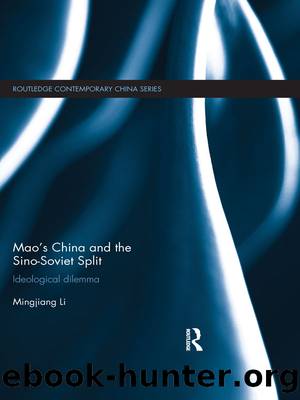Mao's China and the Sino-Soviet Split: Ideological Dilemma by Mingjiang Li

Author:Mingjiang Li [Li, Mingjiang]
Language: eng
Format: epub
Tags: Ethnic Studies, Social Science, Political Science, Regional Studies, General
ISBN: 9781136455438
Google: dtfFBQAAQBAJ
Goodreads: 17542646
Publisher: Routledge
Published: 2012-02-01T00:00:00+00:00
7 Short-Lived Détente and the End of Party Relations, 1965â1966
After the 10th Plenum of the 8th Central Committee of the CCP in September 1962, Mao gradually regained direct control of foreign and domestic policy. He regarded the retrenchment policies proposed and practiced by other leaders during the post-Great Leap Forward years as signs of the growth of revisionism in China, and pushed for nationwide class struggle as the remedy for this contagious disease. Maoâs senior colleagues â Liu, Deng, and Zhou â might not have wholeheartedly agreed with his assessment of Chinaâs domestic political situation and his foreign policies; however, by and large, they went along with Maoâs proposals and supported his major policies at home and abroad. They knew Maoâs authority, personality, determination, and political cunning too well to do otherwise.
The apparent domestic political unity among top leaders would not last long. As the Socialist Education Movement became increasingly radical, more moderate leaders had begun to fear that the movement would ultimately harm the economic recovery. Liu, who was in charge of the movementâs concrete implementation, adopted approaches that differed from Maoâs preferences and expectations. As a result, internal leadership conflicts intensified towards the end of 1964 and in early 1965. The disputes within the leadership led Mao to conclude that the primary source of domestic revisionism was at the top level, as represented by Liu and his supporters. Mao believed that he had to get rid of his opponents in order to secure his own political position and succeed in his drive to wipe out revisionism in China.
Sino-Soviet relations from late 1964 to early 1966 took place in this context. After Khrushchev stepped down in October 1964, there was a short period of détente. Mao conjectured that Khrushchev had been forced to retire because of Soviet domestic opposition to his revisionist policies. He hoped that the new Soviet leadership would thus change course and support Maoâs ideological beliefs. He was soon disappointed, however. Moscow unequivocally told the CCP leaders that they would continue to carry out the policies set in motion by Khrushchev. The Soviet leadersâ policy of attempting to increase material abundance stood in sharp contrast to Maoâs emphasis on political conscience.1 Mao reasoned that fighting against the new Khrushchevite revisionists was not only beneficial, but also necessary for his domestic efforts to save China from revisionist degeneration. The ideological dilemma continued to exercise its negative impact on Sino-Soviet relations and eventually led to a complete break in party-to-party relations in early 1966.
The New Soviet Leadership and Sino-Soviet Détente
The end of the Khrushchev era on October 14, 1964 provided the CCP with a valuable opportunity to change the course of Sino-Soviet relations. Mao immediately convened several Politburo meetings to discuss the leadership reshuffle in Moscow and concluded that Khrushchevâs revisionist policies had gone bankrupt, both domestically and internationally.2 The CCP leaders thought that Khrushchevâs revisionist policies had contributed to his ousting and hoped that the new Soviet leadership would change course in both its foreign and domestic policies.
Download
This site does not store any files on its server. We only index and link to content provided by other sites. Please contact the content providers to delete copyright contents if any and email us, we'll remove relevant links or contents immediately.
Cecilia; Or, Memoirs of an Heiress — Volume 1 by Fanny Burney(32548)
Cecilia; Or, Memoirs of an Heiress — Volume 2 by Fanny Burney(31947)
Cecilia; Or, Memoirs of an Heiress — Volume 3 by Fanny Burney(31932)
The Great Music City by Andrea Baker(31917)
We're Going to Need More Wine by Gabrielle Union(19034)
All the Missing Girls by Megan Miranda(15958)
Pimp by Iceberg Slim(14488)
Bombshells: Glamour Girls of a Lifetime by Sullivan Steve(14057)
For the Love of Europe by Rick Steves(13914)
Norse Mythology by Gaiman Neil(13349)
Talking to Strangers by Malcolm Gladwell(13349)
Fifty Shades Freed by E L James(13233)
Mindhunter: Inside the FBI's Elite Serial Crime Unit by John E. Douglas & Mark Olshaker(9324)
Crazy Rich Asians by Kevin Kwan(9279)
The Lost Art of Listening by Michael P. Nichols(7494)
Enlightenment Now: The Case for Reason, Science, Humanism, and Progress by Steven Pinker(7306)
The Four Agreements by Don Miguel Ruiz(6745)
Bad Blood by John Carreyrou(6611)
Weapons of Math Destruction by Cathy O'Neil(6265)
